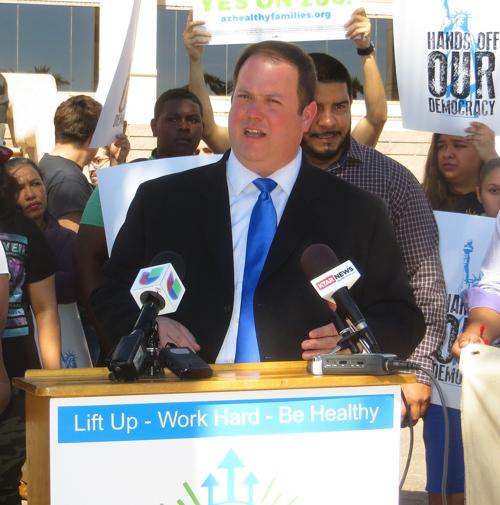PHOENIX — The attorney for business interests hoping to void the just-approved minimum wage hike urged the Arizona Supreme Court on Thursday to interpret the constitution in a way several justices suggested would undermine the right of voters to ever again propose their own laws.
Attorney Brett Johnson representing business interests opposed to Proposition 206 argued the measure violates a 2004 constitutional provision that says any voter-enacted laws must have a source of revenue to pay for any expenses the state is forced to incur.
Johnson argued the initiative does have such a mandate because it requires the Industrial Commission, which enforces labor laws, to come up with rules to deal with a new requirement in the measure that all employers must provide paid sick leave. And he said there are enforcement costs.
But Justice Ann Scott Timmer said such a literal interpretation of the “revenue source rule” has major implications. She said, for example, that if a state agency was required to send out one notice about the new mandate that would be an increase in costs to that agency. That’s true, Johnson responded, triggering the rule and the mandate for a funding source.
That clearly left Timmer troubled.
“Doesn’t that construction essentially eliminate the citizens’ ability to pass any initiative?” she asked. “It’s difficult to imagine an initiative in this day and age that wouldn’t require a letter or something ministerial, required by the government.”
The interpretation Johnson was urging that the failure to find dollars for even the smallest expenses also troubled Justice Robert Brutinel. “Is there any initiative that wouldn’t violate it?” he asked.
Johnson did manage to come up with one: Proposition 122, a 2014 ballot measure that enshrined in the Arizona Constitution that the state has the power to refuse to use its resources to enforce federal laws it contends are illegal.
Brutinel pursued the questioning, asking whether even a minor cost to the state would void an initiative that did not include a new revenue source.
“If there is a required action of the government that is going to cost money, then, unfortunately, yes, there is no proposition that would not violate the revenue source rule,” Johnson responded.
It wasn’t just the justices who questioned what voiding Prop. 206 would mean to the future of initiatives. Attorney General Mark Brnovich, who attended Thursday’s hearing, said afterward there is a real danger.
“You could come up with hypotheticals or scenarios in every single situation that is passed by the voters,” he said. “And so, you would essentially gut or undermine the state initiative process if you accepted the logic of what the plaintiffs argued today.”
If that cost to the Industrial Commission doesn’t convince the court to void Prop. 206, Johnson has another theory. He said the initiative will cost the state millions of dollars as the Medicaid program is forced to pay more to the private entities that provide things like home health care for the poor.
But that drew a skeptical response from some of the justices. They questioned whether the initiative itself actually requires the state to pay its providers more or it’s simply a question of state officials saying they believe it’s necessary.
And even if there is a mandated expenditure, Assistant Attorney General Charles Grube said that still does not void the entire minimum wage hike.
“The remedy is not to say that there was a mandatory expense and so the proposition was wrong,” he told the justices. “The right way to look at it is ... that public officials have no obligation to act unless there is an appropriation.”
Put simply, Grube said, a decision by state officials that they need to pay providers more so they can afford to pay their workers the new $10 minimum is discretionary. He said nothing in the initiative actually directs the state to boost the reimbursement rate.
But Johnson, who is trying on behalf of the business community to void the entire initiative — and not just have the state escape some costs — wants the justices to adopt his legal theory that there are mandatory expenses and that the failure of Prop. 206 supporters to come up with a way to fund them invalidates everything voters approved in November. And that, in turn, would put the state minimum wage for everyone back to $8.15 an hour, what it would have been Jan. 1 had Prop. 206 not passed.
Most of the justices were skeptical of Johnson’s claim that there are identifiable expenses to the state linked to Prop. 206.
During the arguments, only Justice Andrew Gould seemed inclined to go along with Johnson’s arguments that Prop. 206 does, in fact, mandate the state to spend more. He said the state, in agreeing to take federal dollars, is obligated by federal law to pay its providers enough to ensure there are enough people to provide care to Medicaid recipients.
The justices gave no indication when they will rule.





